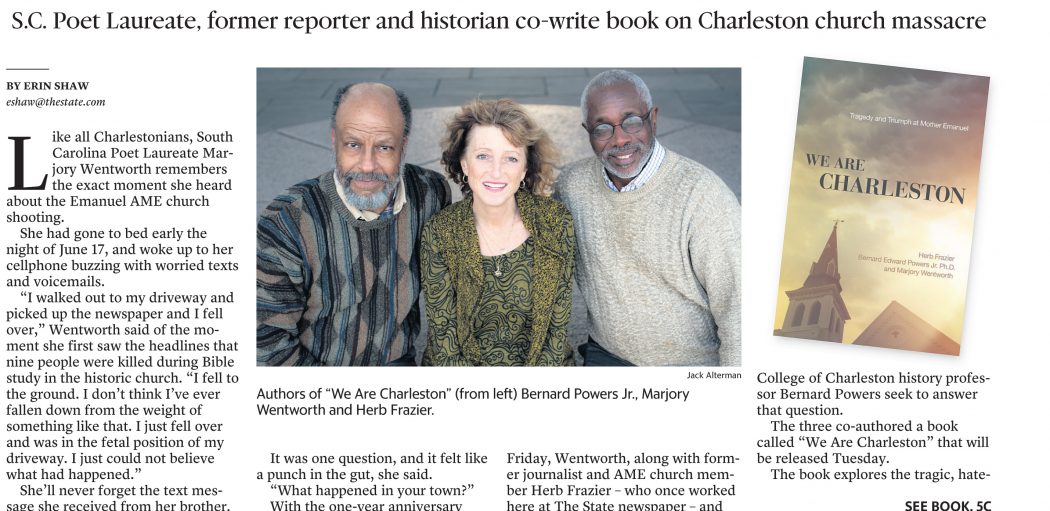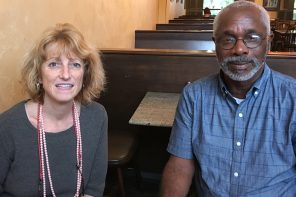By BY ERIN SHAW. Read it here.
We have to think about how this happened,’ author of book on Charleston church massacre says
“We Are Charleston” book comes out Tuesday
Explores the shooting at Emanuel AME church, why it happened
S.C. Poet Laureate, former reporter and historian co-wrote book
Like all Charlestonians, South Carolina Poet Laureate Marjory Wentworth remembers the exact moment she heard about the Emanuel AME church shooting.
She had gone to bed early the night of June 17, and woke up to her cellphone buzzing with worried texts and voicemails.
“I walked out to my driveway and picked up the newspaper and I fell over,” Wentworth said of the moment she first saw the headlines that nine people were killed during Bible study in the historic church. “I fell to the ground. I don’t think I’ve ever fallen down from the weight of something like that. I just fell over and was in the fetal position of my driveway. I just could not believe what had happened.”
She’ll never forget the text message she received from her brother.
It was one question, and it felt like a punch in the gut, she said.
“What happened in your town?”
With the one-year anniversary Friday, Wentworth, along with former journalist and AME church member Herb Frazier – who once worked here at The State newspaper – and College of Charleston history professor Bernard Powers seek to answer that question.
The three co-authored a book called “We Are Charleston” that will be released Tuesday.
The book explores the tragic, hate-fueled events that occurred at Mother Emanuel last summer, when a white young man joined Bible study before opening fire on the African-American church-goers.
“We Are Charleston” dissects what happened, delving into the history of the AME church and the history of slavery and racism in Charleston, in an attempt to provide context for the massacre.
“It came out of being able to really describe the experience of what it felt like to be here at that time and place. We were all here when it happened and the book is framed by what it felt like to be in the community at the time,” Wentworth said.
Below, Wentworth talks about how the book came together, her toughest interviews with friends and family of the deceased, and the nature of forgiveness.
After the initial shock and grief, what do you remember about Charleston during that time immediately following the shooting?
Wentworth: The feeling in the air was, What do you need? What can we take care of?
I’m astounded by what people were doing for one another in the immediate aftermath. I could feel that right away. I can’t believe it’s been a year already. There’s this feeling of life before that and life after that. You’re just not the same again. When that kind of evil happens in your backyard, you have a different sense of what’s possible in the world.
There’s this feeling of life before that and life after that. You’re just not the same again.
Marjory Wentworth
Related: A year after the Charleston church shootings, what has changed?
How did you, Herb Frazier and Bernard Powers come to write this book together?
Wentworth: I knew Herb and associated him with Emanuel because I knew he grew up in the church. I called him and asked him about writing a book and he said he’d woken up that morning thinking that he should do just that. A few days into it, we realized a big part of what we wanted to write about was historical. Herb suggested Bernie Powers, because he was doing a book on the AME church already. It very quickly came together like that.
[After the shooting], everybody wanted to do something. Some people wrote a check, some people gave out water. And we’re writers. By writing a book, we could provide context and really honor everyone who died at the church and give a sense of who they were beyond the newspaper headlines.
Who did you interview? What was the most difficult interview?
Wentworth: We interviewed lots of the family members, which was really difficult because they’re talking about the worst thing that ever happened to them. On the other hand, they were very generous with their time. They told stories that brought their loved ones to life, which I think has a very redemptive quality when you put it in a book.
Then there were people who were willing to meet and wanted to talk, then changed their minds and said they weren’t ready. And that’s fine. I think with any grief, people go through different phases. We paid very close attention to who wanted or didn’t want to talk. Within families, there were differences in how they felt about forgiveness, the death penalty. We had to be careful in terms of people getting emotional and saying something in an interview that they maybe didn’t mean. The last thing we wanted to do was cause anymore pain.
We can’t go back and change anything, but we have to think about how this happened.
Marjory Wentworth
Relate: ‘Don’t talk about how she died. … Talk about her legacy’
After such a horrible thing happened in Charleston, has your view or opinion of the city changed?
Wentworth: My opinion of the city hasn’t changed. Part of what we kept returning to in the book are these contradictions about the city, starting with the fact that Mother Emanuel is on Calhoun Street (named after slavery supporter John C. Calhoun). The whole city is made up of these contradictions. You can’t hide from it anymore, I guess.
We interviewed (AME church Rev.) Joseph Darby and he referred to Charleston as Confederate Disneyland. And you can certainly come to Charleston and do these tours and not understand the African-American part of our history, which in some ways has been left out of the story. We can’t go back and change anything, but we have to think about how this happened.
I mean, Walter Scott was shot two months before that. So to have those two things together, you can’t deny the racism that is pervasive. Both those things did not happen in a vacuum. When you think back on that, it’s pretty horrifying.
And yet, the book has an entire chapter called “Forgiveness,” which talks about the way many of the victims’ families stood up in court and said they forgave accused killer Dylann Roof. What were your takeaways from that?
Wentworth: The forgiveness piece is much more complicated than I understood until I got involved with writing about it. I hope that we give a richer sense of where that comes from. Enough so that people read it and understand it in a way they didn’t before, and maybe think differently about people who are different than them, people who have wronged them. I hope there’s a takeaway that helps people a little bit. It really is a lesson for the world.
This interview has been edited and condensed.
Related: Dylann Roof’s death penalty trial set for November
In Columbia: Remembering the Emanuel 9
Here, a sampling of Columbia area events marking Friday’s anniversary of the shootings at Emanuel AME Church in Charleston:
Bible study, unity walks to honor Charleston church victims on anniversary of shooting
A DAY OF REMEMBRANCE AT THE STATE MUSEUM: 10 a.m.-5 p.m. Friday at S.C. State Museum. The museum will offer the public an opportunity to reflect on the lives of the nine people killed in Charleston. Museum guests can write notes about their memories from this day, as well as reflect and share thoughts on recent tragic events. Event is free with general admission. 301 Gervais St. www.scmuseum.org
THE CHARLESTON NINE: REMEMBERING WITH LOVE, ACTING WITH CONVICTION: 6:15 p.m. Wednesday at Pacific Park. There will be testimony by two young men from the community about the impact of gun violence; music and dance, recognition of victims and survivors of gun violence; and audience participation. There will be a ceremony to remember the nine Emanuel victims. Participants will be invited to remember victims of gun violence by adding to the anti-violence memorial tree at the park. 200 Wayne St., behind the gas station next to 701 Whaley. Visit the Faith Coalition on Gun Violence Facebook page for details and resources: https://www.facebook.com/faithcoalitionongunviolence/
DANCE TO REMEMBER, DANCE TO HEAL: Among the local events marking the anniversary of the Emanuel AME Church shooting in Charleston is a new ballet from Columbia City Ballet. Columbia City Ballet will produce and perform “Emanuel 9” during its 2017 season as “an homage to the indomitable human spirit.” The ballet will be performed March 31 at the North Charleston Performing Arts Center and April 7-8 at the Koger Center for the Arts. www.columbiacityballet.com



